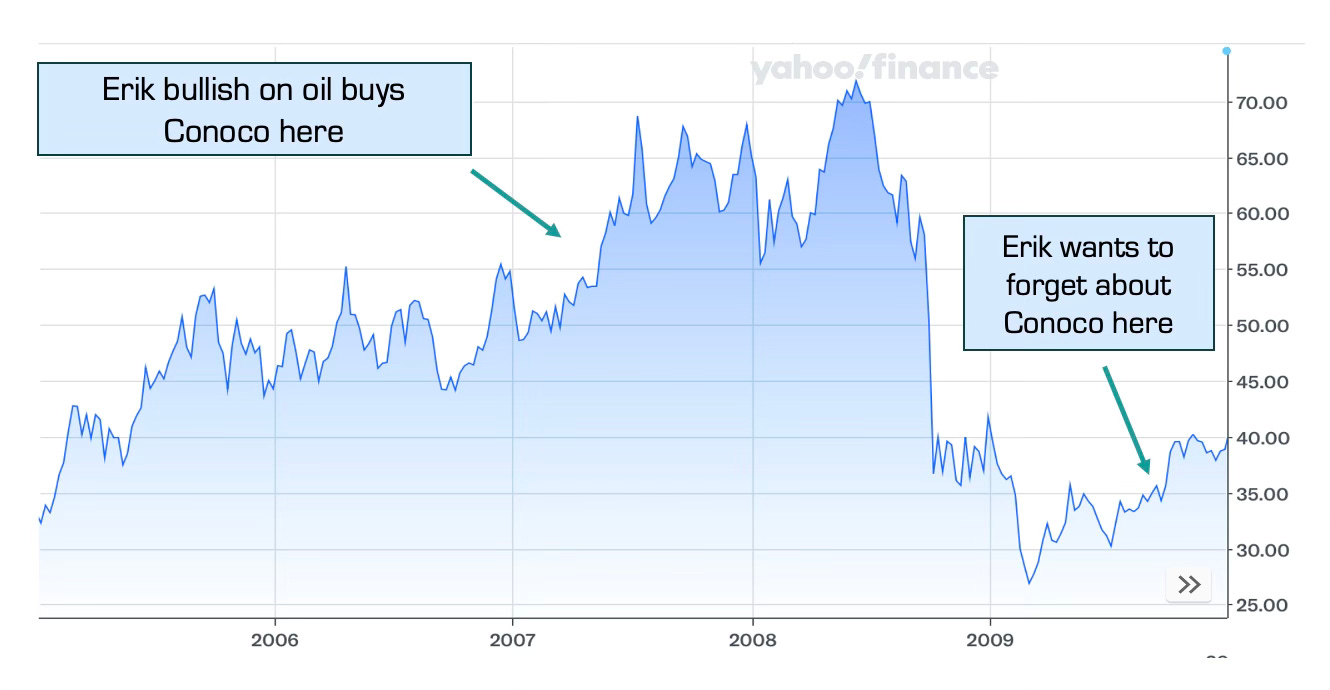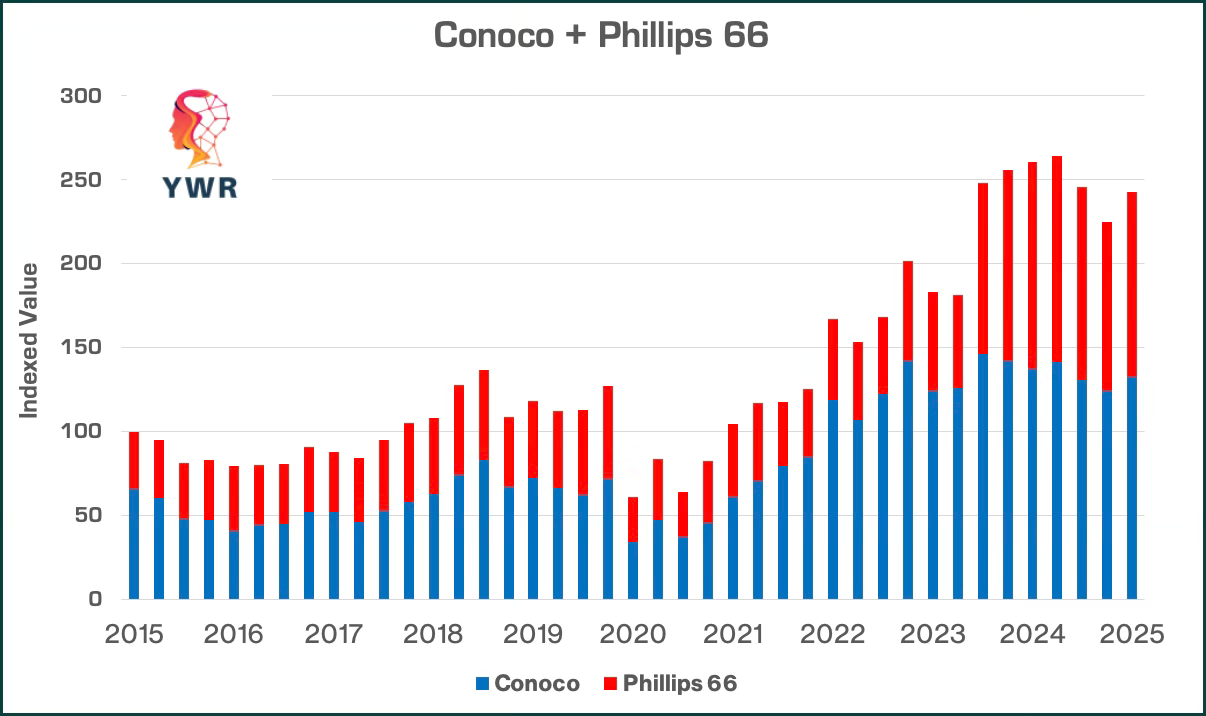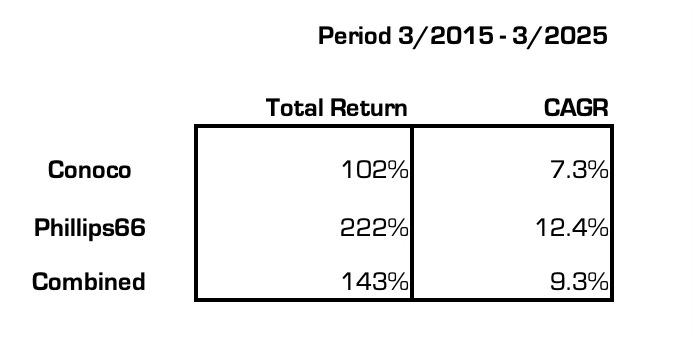YWR: How Conoco Changed My Life.
I’ve written before how Zimbabwe changed everything for me when it comes to investing (7 things I learned in Zimbabwe, Bad is Good). And I wished I’d realised it all earlier in my career.
But I also need to tell you about Conoco. My other life changer.
The Smart Money
Trying to forget Conoco
The Awakening
The power of 9%
Models, moats and Management
Getting rich slowly
A +100% fast money idea.
The ‘Smart’ Money
In 2009 I was a trading maniac. Well, maybe not a maniac, but ‘highly active’. Everyday I sat at on a trading desk on the 36th floor of an office building in San Francisco with 8 flat screens in front of me. A wall of lights.
The top left screen showed my positions, and second by second P&L. The rest of the screens were filled with various Bloomberg monitors following everything in the world. Currencies, indices, commodities, yields, spreads, news, whatever my ADD mind thought could be useful.
Blinking lights everywhere.
My eyes would dart around in a circuit from one monitor to the next. But always coming back to the top left. The P&L. If I was at my desk (and not in a meeting) I looked at that P&L every 90 seconds. Because on December 31 I got 10% of that number.
Directly behind me was a floor to ceiling window with one of the best views in the world.
Best view in the world, and I never looked at it.
Because I was an anxious rat fixated on my screens, and my constantly fluctuating P&L.
Around me were 7 other traders doing the same thing.
The room was a buzz of activity. If it was quiet, then something was wrong. Because the one thing you were not supposed to do was ‘just sit there’. You were meant to always be on the phone talking to sell-side analysts, or filling your calendar with meetings. You were meant to always be generating and trading new ideas. Our turnover was in the multiple 100’s of % a year.
And if an investment idea wasn’t working (-10%), you were supposed to cut it and ‘move on to the next’. Ideas not working out was fine, part of the business, but not selling them and finding a new idea was against the entire ethos of what you were supposed to be doing. The whole thing was frenetic. But it was a hedge fund, and it seemed like this was how it should be.
Trying to forget ‘Conoco’
It was 2009 and we had just come off the greatest market crash since the 1930’s. I was trading a long/short book of global financial stocks. And really that was the most important thing I should be focusing on.
I should be thinking about the book, and not wondering what to do with Conoco.
You see back in 2007 when oil was at $100/barrel, I joined the commodity boom and bought shares in Conoco for my personal account.
Of course Conoco later crashed in 2008 along with the oil price and everything else. At one point I was down 50% from my entry price. What a total embarrassment. What an idiot I was for getting sucked into the whole commodity boom right at the top!
Now in 2009 Conoco had recovered a little from $25/share to $35. Maybe this was a good time to sell it. Just ‘move on’. But it kind of annoyed me that I was going to have send this compliance form around to everyone to get permission to sell it. All the other PM’s were going to have to sign off that they weren’t going to trade Conoco for their books for the next 30 days. So this trade was going to be very public in our small firm. And it was going to make me look like an idiot in front of my peers.
‘Look at Erik taking a big loss in Conoco…’
Or, maybe I could just forget about Conoco and do nothing. It wasn’t a huge position in my personal account. Maybe I would just forget about Conoco and focus on trading my book and my P&L. And I was still kind of bullish on oil anyways. Who knows. Maybe it would work out.
So, I did nothing and decided to not look at Conoco, or anything else in my personal portfolio which had all been smashed by the 2008 crisis.
2013: The Awakening.
Around 2013 I stared to notice that Conoco was doing quite well.
All by itself the share price had recovered back above my original purchase price. In addition, unbeknownst to me (because I wasn’t paying attention), in 2012 Conoco had spun out shares in their refining business, Phillips 66. In my brokerage statement I now had shares in this new company which I had never even paid for. And the share price of this new Phillips 66 was doing well too!
In my brokerage account I have dividends set to automatically reinvest. So without thinking about it, over the years (6 at this point) every quarter I had been reinvesting and buying more shares of Conoco, and also Phillips 66. The two positions together were worth a good deal more than I had originally invested in 2007.
And all this had been going on while I wasn’t even paying attention…. I had seriously done nothing. Not even looked at an earnings release in over 6 years.
And the same thing was happening with other stocks I had bought pre-2008. As I went over the brokerage statements and scanned the monthly transactions (receive dividend, dividend reinvest) I could see the combined power of a rising stock price on a steadily growing number of shares.
And this was with a sleepy stock like Conoco, not Amazon.
Realisation #1: The power of reinvesting dividends over time.
The power of 9%.
My brokerage statements don’t go back to 2007, so I can’t find what I paid for that original Conoco position, but since 2015 the two shares together, with dividend reinvestment, have been compounding at over 9% for 10 years.
And you realise, 9% a year is pretty good. If a company really can compound at 9% for 10 years, which often they don’t.
And it turns out the largest sovereign wealth fund in the world compounds at 7%.
And so now later on in life I find I’m less interested in talking about how to make 20% in one year, and more interested in how to make 9% for 10 years.
Realisation #2: You don’t need to swing for the fences. 9% compounded is pretty good.
Business Models, Moats and Management
This is still a work in progress for me, but as I try to hold stocks for longer periods of time, I find myself more focused on the little things companies are doing.
I am interested if companies are gaining share in their industry, and whether the management really are ‘switched on’, or just corporate morons. Are management doing those little things to grow the business and strengthen their network effects? Is there a good culture? Do management really care about the company over 10 years? I am increasingly drawn to founder run companies, or where the founder still has a big shareholding. I want to know somebody with skin in the game is paying attention to what is going on, because ‘Boards of Directors’ are useless.
It’s also made me less reactive to macro news. If you stretch out your holding period, the macros come and go. Companies with a strong market position manage well through the tough years and then really slingshot out the other side when things improve. Like how JP Morgan came out of the financial crisis even more dominant and profitable than before. For those companies, the crises are actually a longer term benefit. This was also one of the 7 lessons from Zimbabwe.
Realisation #3: Micro trumps Macro over the long-term.
Getting rich slowly.
Supposedly, Jeff Bezos once asked Warren Buffet ‘Your investment thesis is so simple. You’re the second richest guy in the world, and it’s so simple. Why doesn’t everyone just copy you?”
Warren Buffett responded to Jeff by saying, “Because nobody wants to get rich slowly.”
Such a great point. The greatest investor in the world and we can all see what he is doing everyday. Berkshire is a public company. Yet none of us copy Berkshire Hathaway. And none of us have a 1 stock portfolio with just Berkshire.
Because we all think we can do it faster.
And that is our demise.
And, sorry to say, public service announcement to anyone who signs up for those courses or trading systems which supposedly show you how to make great returns on short term trading; none of it works.
I’ve sat on a good number of trading desks, and seen a good number of actual P&L’s and never seen a fast money trader who does any better, over time, than just doing nothing and owning an index fund. Not saying great traders don’t exist, just saying they are super rare, I’ve never met one, and 99% likelihood you aren’t one either. And obvious side note: if a trading system actually worked, the inventor would not care about advertising it on TV, and teaching it to you.
A few years ago there was a Dad who was friends with my daughter at school. He used to be an engineer for an F1 racing team, but had retired. So with time on his hands, and some money, his new passion was day trading. He had signed up for a course on how to trade futures and invited me over to his house one day so we could sit down with his laptop and he could show me all his charts, positions and alerts. He explained how “if this line goes above that line, but the other line is green not red, then I do this…” And on and on. We were sitting in his kitchen and I wasn't sure what to say. Do I tell him the whole thing is nonsense?
In the end I did the polite thing and said nothing. Or, said that it looked ‘great’.
The realisation I’ve come back to is what Buffet said, but also the other nuance, which he didn’t say. The more you don’t focus on trying to make money quickly, the faster it actually happens.
Focus on your day job, or your business, instead of the stock market. It doesn’t need that much attention. Over time it will take care of itself.
If you focus on buying relatively good companies, adding consistently to your account, and reinvesting the dividends, the flywheel turns slowly at first, for years even, but then picks up. Until, later on you are like Buffet, things are compounding, and actually you are making money quickly.
Realisation #4: Making money slowly isn’t actually slow.
A +100% fast money idea
That said, it’s still nice to make +100%, and not take 10 years to do it.
So here’s an idea.







